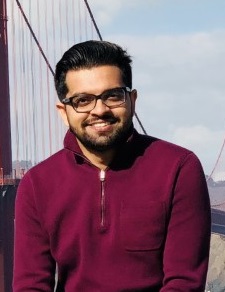
Here’s How Social Distancing will Affect Our Economy
An analysis by Usama Salim ’17 predicts it will save $1.6 trillion and millions of lives

As he hunkered down in his Waltham apartment, doing his part to help “flatten the curve,” Usama Salim ‘17 checked social media and online news outlets for the latest updates about the COVID-19 pandemic. With four family members, all doctors, on the front lines back in Kuwait, he had a personal interest in the coronavirus as it spread across the globe.
A technology consultant with Deloitte, Salim was scrolling through Fishbowl, a professional network app, when he saw a comment that gave him pause. Another consultant had posted that “the economic impact of social distancing is far worse than the loss of human life caused by coronavirus.” Salim was intrigued: Could this statement be true?
It’s a question many in the nation — and around the world — have been asking. And while there’s no shortage of answers, including among U.S. politicians, Salim notes that most are based on opinions, not facts. “People can speculate all day long,” he says, “but unless you’re using hard data and doing some kind of analysis, it’s all just talk.”
Salim was determined to find an evidence-based answer. With his Economics-Finance degree from Bentley, he was well-versed in using statistical models to assess economic risks and benefits. To determine the economic consequences of COVID-19, he began as he would with any classroom assignment: by gathering comprehensive data from a variety of sources.
How Politics Slowed the U.S. Response to COVID-19
First, Salim collected U.S. government figures about total population, demographic breakdown, employment rates and economic output. From the Chinese Center for Disease Control and Prevention, he found statistics about COVID-19 infection rates and health outcomes in that country. A final, and critical, piece of information — the total number of ventilators available to American patients — came from the Center for Health Security at Johns Hopkins University.
After running the numbers, Salim concluded that, without social distancing policies in effect, as many as 15.8 million Americans (5 percent of the population) would die because of a lack of ventilators. According to his analysis, without social interventions to mitigate the spread of the virus, hospitals would be flooded with coronavirus patients and demand for ventilators would surpass the existing supply in as few as three weeks.
As for the economic impact, Salim finds that, without social distancing measures in place, roughly 30 percent of the nation’s workforce would be sidelined by COVID-19, resulting in a $2.9 trillion loss to the U.S. Gross Domestic Product. But enacting social distancing measures would slow infection rates, reducing the economic hit to $1.3 trillion. In other words, according to his analysis, in addition to saving lives social distancing would save the U.S. economy $1.6 trillion.
The Economic Impact of COVID-19
Since publishing his findings on March 18, Salim says he’s received overwhelmingly positive feedback from professional colleagues. Stanton Research Professor of Economics Dhaval Dave, who taught Salim in his Health Economics course, says: “What Usama does here is present a careful, well-thought-out framework for thinking about the cost and benefits of social distancing.
“We hear policy-makers lamenting the current loss in economic activity due to the shelter-at-home and lockdown-type interventions,” Dave says, “but what's been lacking is a careful evaluation of the short-term versus long-term consequences of these measures. Usama’s analysis provides a good starting point for thinking about this.”
For his part, Salim credits his Bentley professors for making his research possible. “I’ve known since I was in seventh grade that I wanted to go to business school,” he says. Initially intent on a career in mergers and acquisitions, he discovered a passion for economic theory and market analysis after taking classes like Professor Dave’s.
Students who graduate from Bentley, Salim says, “come out knowing not just about business, but all these other, inter-related aspects of how the world works. Bentley does a really great job preparing us to think critically and creatively about any subject” — including, as it turns out, global pandemics like COVID-19.

